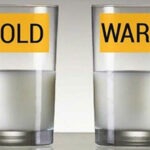How To Spot contaminated Water: You might not think it’s possible, but water can go bad. Contaminated drinking water is caused by different culprits—from polluted surface water sources, and bacteria, to human error. If you suspect that your water has gone bad, there are several signs of contaminated water you should watch out for. It’s important to take precautions and know how to spot contaminated water.
How To Spot contaminated Water
DOES WATER EXPIRE?
After leaving water in your car for a while, you may wonder “does bottled water go bad?” Contrary to what you might think, water does not expire or lose its health benefits the longer you store it. However, the plastic bottle itself may leach chemicals into the water over time so the bottle typically has an expiration date of two years after the manufacturing date. Water can also be contaminated with bacteria, and chemicals through different water sources which can be unsafe to drink. When it comes to tap water, be wary of areas that are at high risk for pollution, such as near industrial plants or livestock facilities. Your water could also become contaminated if it isn’t treated or filtered properly.
WHAT DOES BAD WATER LOOK AND TASTE LIKE?
Sometimes, it is easy to spot contaminated water by looking and smelling alone. However, while taste and smell are important factors in determining bad water, it’s possible to have bacteria in your water that isn’t noticeable to the human senses. Check your water if it has the following signs below:
CHECK IF YOUR WATER IS CLOUDY OR MURKY
Several different types of bacteria can contaminate water, including coliform bacteria and E. coli. Coliform bacteria are found in soil and feces, so they can easily contaminate water sources, and E. coli is found in the intestinal tracts of animals, especially cattle. If you see cloudiness or a murky appearance in your water, bacteria could be the culprit. If your tap water is safe to drink, clear, and doesn’t have suspicious odors or tastes, it’s unlikely that it has coliform or E. coli bacteria, but it’s still a good idea to keep an eye on your water and check for other signs of contamination. Bacteria can also be found in water that comes from springs and wells, so if your source is at risk for contamination, it’s important to be aware of the signs so that you can take precautions and avoid getting sick.
YOUR WATER SMELLS LIKE BLEACH OR ROTTEN EGGS
If your water has a strong odor, it could be a sign of contamination. Certain gases like hydrogen sulfide can cause your water to smell like rotten eggs. This gas occurs naturally in groundwater and when exposed to bacteria, it becomes sulfate which causes dehydration and diarrhea.
Also, beware of water with a strong bleach smell. Water that smells like bleach may indicate excess chlorine in your local water system. While chlorine is added to water to eliminate bacteria, it creates byproducts when mixed with organic compounds. These byproducts may cause kidney problems, skin irritation, and cancer risks.
DOES YOUR WATER FEEL SLIMY?
If your water feels slimy or has an oily or slimy feel to it, it could be contaminated. Contaminants like bacteria, algae, and pesticides can cause water to feel slimy, especially if your water comes from a surface water source like a pond or lake.
Another reason for slimy water is the excess buildup of calcium or magnesium in the water. You may feel like you need more water to wash off soap or detergent. While excess calcium and magnesium might not cause harm, it can indicate the presence of other metals like aluminum or lead.
DISCOLORED WATER
The source of discolored water can be many things, from debris to algae. Another cause could be sedimentation in the pipes or plumbing system, which could result in cloudy or brown water.
When you spot a blue or green tint in your water, it could indicate excess copper from corroded pipes. Large doses of copper can lead to anemia as well as liver and kidney damage. If you suspect your drinking water is discolored, contact your local utility company to get the problem sorted out as soon as possible or consider changing your drinking water sources.
YOUR WATER TASTES LIKE METAL
If your water tastes like metal, it may have a high level of iron. While water with a high level of iron isn’t harmful, it can also be a sign of contamination from other substances like manganese, zinc, copper, and lead.
Also read: Top 8 Signs That You’re Drinking Contaminated Water
OILY FILM ON TOP OF WATER
If you see an oily film on top of your water, it could be a sign of oil and grease in your water supply. This can be caused by poor water filtration, a leak in your water supply, or subpar water treatment.




